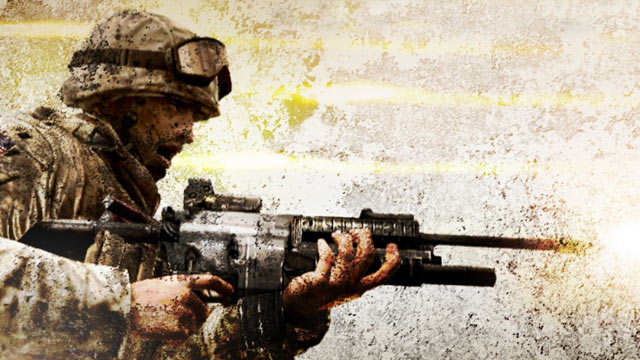
In the fall of 2007, everyone assumed that Halo 3 would conquer the universe. Halo single-handedly gave the original Xbox a reason to exist, and Halo 2 defined online multiplayer for consoles. So with the series finally making its HD debut on Xbox 360, there was no doubt in anybody’s mind that it would be a major success, and it was. The game set massive sales records and dominated the attention of almost every Xbox 360 owner.
However, Call of Duty 4: Modern Warfare, a much-anticipated game in its own right, launched a couple months later and knocked Master Chief off his throne with surprising vehemence. Ever since then, the Call of Duty franchise has dominated this generation more than any other single title or franchise, regardless of genre or system.
Call of Duty was made by Infinity Award, a studio founded in 2002 by key personnel responsible for EA’s successful Medal of Honor: Allied Assault. In 2003, Infinity Ward partnered with EA’s biggest rival, Activision, to develop and release Call of Duty for PC, which continued with the WWII setting found in the team’s previous work. Despite the plethora of WWII-based shooters in the market and the fatigue it was causing gamers, Call of Duty turned out to be a major success, with critics and gamers alike praising the game’s high production values, outstanding online multiplayer, and awe-inspiring set-piece moments the series would become known for.
The game’s success led to expansion packs and a spin-off for consoles developed by other teams. In 2005, Infinity Ward returned with Call of Duty 2, which featured significantly enhanced sound and visual design while still delivering intense enough gameplay to push through the continued WWII malaise in the market. CoD2 also marked the main series’ new commitment to consoles, as it was released with the launch of Xbox 360 and was considered the new system’s best game at the time. 2005 also saw the release of Call of Duty: Big Red 1, a spin-off for PS2, GameCube, and Xbox that was developed by Treyarch, who would go on to develop Call of Duty 3 and earn its place as the franchise’s B-team.
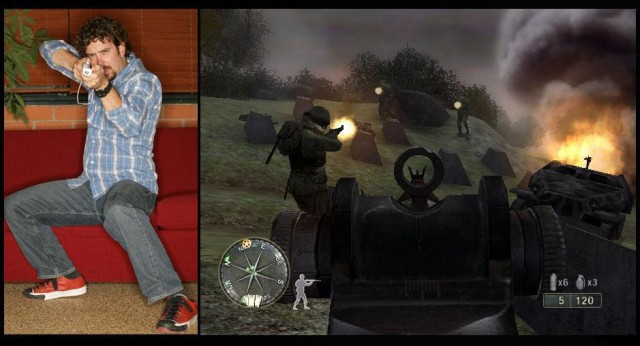
When Call of Duty 3 came out in 2006, it was a great game but didn’t push the envelope the same way as Infinity Ward’s entries did. Regardless, CoD3 did well and even marked the franchise’s first appearance on Wii, but it was obvious that the fanbase was much more excited for Infinity Ward’s next release.
When Call of Duty 4: Modern Warfare launched in 2007, it really was a major change for the franchise. First and foremost, the game dumped the historic WWII setting for a completely fictional near-future with a firm foundation in real world technology and events. The guns were real weapons you would expect to see in a soldier’s hands and the battlefields centered around the Middle East and Eastern Europe, two real world powder kegs where full blown war really is a day to day possibility.
This change to a fictionalized approach allowed for the developers to craft more dramatically intense experience with a handful of shocking and memorable moments. The game’s opening sequence, in which the player looks through the eyes of an unnamed Middle Eastern nation’s leader as he is led to his execution at the hands of terrorist dissidents, and controlling a soldier during his last, fleeting moments following a nuclear blast, stand out as particularly well-crafted events that will remain etched in the memories of countless gamers for a long time to come.
As exceptional as Modern Warfare’s campaign was, the game’s multiplayer is what truly earned the franchise its place as the current biggest name in gaming. Infinity Ward accomplished this by adding an experience and customization system for weapons and abilities– an RPG-like element that encouraged gamers to play around with different combinations of weapons, perks, and attachments to create personalized classes and unlock even more options to play around with. The constant flow of rewards and deep customization features combined to create an addictive, original experience that more traditional and straightforward shooters like Halo 3 simply couldn’t compete with. The formula proved so successful in Modern Warfare that many players have stuck with the game to even today, eschewing the more recent additions in the series and the alterations they have made to the system.
Call of Duty: World at War launched in 2008 and marked the return of Treyarch as developer. The game stuck with the same graphics engine and level-up system as Modern Warfare but returned the series to its roots by once again diving into the well-traveled waters of WWII. World at War did set itself apart by focusing half of its campaign on the less-explored Pacific campaign of the war, but the end result was similar to that of CoD3— successful, but most gamers simply preferred the modern weapons and settings of its predecessor. These gamers were plenty pleased to learn that Infinity Ward would be returning with a direct sequel to Modern Warfare and that excitement ultimately built up to make Modern Warfare 2 the biggest entertainment launch ever, easily trumping Halo 3’s record.
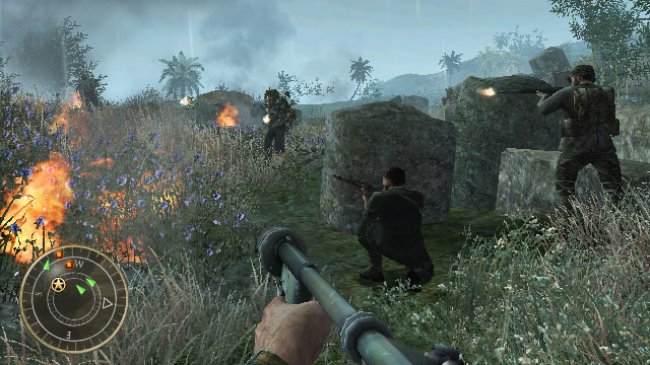
Modern Warfare 2 maintained strong sales for months and has easily been the most-played online game of 2010, in spite of many gamers growing frustrated with major balancing issues and several waves of major glitches and cheating. This year, Treyarch is at the helm again with Call of Duty: Black Ops, which has gone with a Cold War setting, allowing for a of mix semi-modern and historical elements, and an emphasis on secretive operations that leave plenty of room for narrative creativity. Given the problems with Modern Warfare 2 and Treyarch’s reputation as being “beneath” Infinity Ward’s talent, Black Ops could be in for choppier waters than its predecessors, but given pre-order numbers and general buzz, it should do just fine. By the time you read this, Black Ops will be out and Activision will probably have announced how many billions of dollars it made at launch.
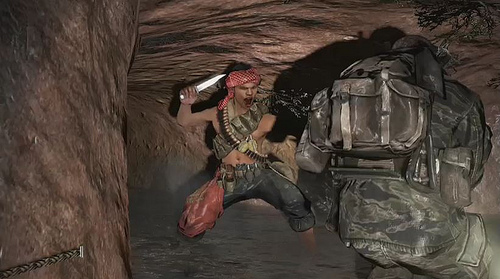
The franchise’s successful and interesting history makes for a worthwhile story, but looking at it as a Nintendo fan, you may question why you should be as excited. The answer is simple. Call of Duty is one of the few, major mainstream franchises that consistently arrives on Wii and DS. In fact, while the core fanbase might prefer Infinity Ward’s contributions to the series, Treyarch has always been better about acknowledging fans of the series on Wii. With Call of Duty 3, World at War, and now Black Ops, Treyarch has always delivered the Wii version right alongside its HD counterparts. Infinity Ward, so far as I know, has never even touched a Wii dev kit; the only title it developed that made its way to Wii was Modern Warfare: Reflex Edition which arrived two years after the initial launch in the form of a superb port handled by– you guessed it– Treyarch.
The fact that Treyarch was simply kind enough to give Wii owners a taste of this generation’s most popular series is not reason enough for me to give the developer such credit. No, it earned my respect because it didn’t cut corners while doing it. Wii has seen its fair share of quick and dirty ports from “next gen” consoles (I’m looking at you, Dead Rising), but Treyarch does its best to deliver a truly superb product. The mere fact that it got Infinity Ward’s impressive technology running on Wii was impressive enough, but the fact that it runs so smoothly is even better.
More important than the tech is the fact that Treyarch has not stiffed Wii owners on features. All the maps, weapons, challenges, and leaderboards are there. The only real loss in the transition aside from graphics is that the Wii version supports fewer players online. However, this is ultimately what allows the game to run just as, if not more, smoothly than the PS3 and 360 versions.
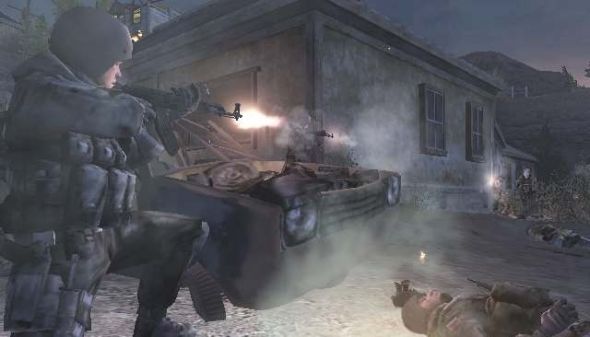
We now have a greater appreciation for Call of Duty’s rise to super stardom and how Wii has, for once, not been neglected in the process, but the future remains a big question for the franchise. Activision’s head honcho, Bobby Kotick, announced intentions earlier this year to cash in on the franchise as much as humanly possible by continuing yearly sequels as well as creating a more adventure-focused title and an online-centric title that will focus on monetizing the franchise’s online multiplayer. This is the same approach Activision took with Guitar Hero, and the flood of titles only served to overwhelm fans and drive many away from that franchise.
The other problem facing Call of Duty is the mass exodus of top level talent that shook up Infinity Ward earlier this year. In March, Activision announced it had fired Jason West and Vince Zampella, Infinity Ward’s top two people, for supposed insubordination. Rumor had it that the pair, among other members of the developer, was interested in developing new ideas, but Activision had effectively tied the studios to Call of Duty for the foreseeable future. So the guys’ allegedly talked with other publishers about leaving Activision and gained support for setting up shop elsewhere.
Given the nature of non-disclosure agreements frequently signed with hirings, firings, and the storm of lawsuits forming around the situation, it will be a while before all the facts become visible. What is known is that West and Zampella struck a deal with EA that has allowed them to start up Respawn Entertainment, where they will create and retain control of a new IP. As for the rest of Infinity Ward, numerous top level personnel also left, with many of them joining Respawn and those who remained with the Infinity Ward have filed suit with Activision over unpaid bonuses from Modern Warfare 2’s incredible success.
In order to facilitate the expansion of the series and maintain momentum while the problems at Infinity Ward are worked out, Activision created Sledgehammer Games with the full intent of focusing the new developer on Call of Duty. With all of these parties at play, it will be interesting to see where the franchise goes after this, especially when you consider the reverence many fans have for Infinity Ward and wondering how much of its talent and prestige was lost with this year’s insanity.
Regardless of what goes on with Infinity Ward, Activision, and Respawn, Call of Duty has made a major impact on gaming over the last several years, thanks to the concerted efforts and great skills of two developers. Infinity Ward brought the series into the world and has traded off with Treyarch year after year, each pushing the other to accomplish more and keep the series fresh. Of course, as a Nintendo fan, we also deserve to give Treyarch an extra round of applause for maintaining the franchise’s quality on Wii. Also, I couldn’t live with myself without giving at least a passing nod to n-Space, the talented developers who have maintained the games’ handheld presence by delivering progressively better experiences on DS.
If there is anybody still wondering how this franchise has emptied so much money from so many people’s wallets, it’s because the people involved worked for it. While some of the games have been better than others, no game bearing the Call of Duty name has been bad, and the vast majority have been exceptional. As uncertain as the future might be for gaming’s favorite FPS, no body can deny Call of Duty’s rightfully-earned success up to this point.




 ShareThis
ShareThis






